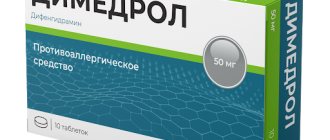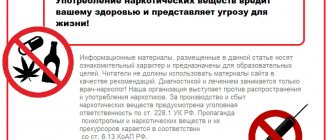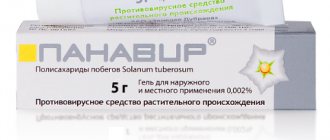Composition and release form
Thioctacid® 600 T
| Concentrate for the preparation of solution for infusion | 1 amp. |
| thioctic acid (as trometamol salt) | 600 mg |
| excipients: trometamol; water for injections |
in a blister pack there are 5 dark glass ampoules of 24 ml each; in a cardboard pack 1 or 2 packages.
Thioctacid® BV
| Film-coated tablets | 1 table |
| thioctic acid (α-lipoic acid) | 600 mg |
| excipients: low-substituted hydroxypropylcellulose (L-HPC LH-22); hydroxypropylcellulose (Klucel EF); magnesium stearate | |
| shell: hypromellose (hydroxypropyl methylcellulose); macrogol 6000; talc; titanium dioxide (E171); quinoline yellow aluminum salt (E104); indigo carmine aluminum salt (E132) |
in dark glass bottles of 30 tablets; 1 bottle in a box.
Thioctacid price, where to buy
The price of Thioctacid tablets, 600 mg, is about 1,600 rubles for 30 pieces.
The drug in ampoules costs approximately 1,566 rubles for 5 pieces of 24 ml.
Price Thioctacid BV 600, for 100 tablets – 3200 rubles.
- Online pharmacies in RussiaRussia
- Online pharmacies in UkraineUkraine
- Online pharmacies in KazakhstanKazakhstan
ZdravCity
- Thioctacid BV tablets p.p.o.
600 mg 100 pcs. MEDA Manufacturing GmbH RUB 3,045 order - Thioctacid 600 T solution for in. 25 mg/ml 24 ml 5 pcs. Meda Manufacturing/Hamelin Pharmaceuticals
RUB 1,512 order
- Thioctacid BV tablets p.p.o. 600 mg 30 pcs. MEDA Manufacturing GmbH
RUB 1,712 order
Pharmacy Dialogue
- Thioctacid BV (tab.p.pl/vol. 600 mg No. 30)Meda Manufacturing
RUB 1,721 order
- Thioctacid (amp. 600 mg/24 ml No. 5) Hameln Pharmaceuticals
RUB 1,507 order
- Thioctacid BV (tab.p.pl/vol.600mg No. 100)Asta Medica/AWD
RUB 2,962 order
show more
Pharmacy24
- Thioctacid-600T 600 mg 24 ml No. 5 injection solution Meda Pharma GmbH and Co.
KG, Nimechchyna 549 UAH.order - Thioctacid-600 HR 600 mg No. 30 tablets Meda Menufektchering GmbH./Meda Pharma GmbH and Co. KG, Nimechchina/Nimechchina
538 UAH order
- Thioctacid HR 600 mg N100 tablets Meda Menufektchering GmbH./Meda Pharma GmbH and Co. KG, Nimechchina/Nimechchina
1250 UAH order
PaniPharmacy
- Thioctacid HR tablets Thioctacid 600 HR tablet. 600 mg No. 100 Germany, MEDA Manufacturing
1447 UAH. order
show more
Pharmacodynamics
Thioctic (α-lipoic) acid participates in mitochondrial metabolism in the cell and functions as a coenzyme in the complex for the transformation of substances that have a pronounced antitoxic effect. They protect the cell from free radicals that arise during intermediate metabolism or during the breakdown of exogenous foreign substances and from heavy metals. The synergistic effect of α-lipoic acid in relation to insulin is known to increase glucose utilization. In patients with diabetes mellitus, thioctic acid leads to a change in the concentration of pyruvic acid in the blood.
Pharmacokinetics
Thioctacid® BV
When taken orally, it is quickly and completely absorbed from the gastrointestinal tract. Concomitant food intake may reduce the absorption of the drug. Cmax in blood plasma after taking 1 tablet. Thioctacida® BV is 4 μg/ml; the time to achieve it is 25–30 minutes. Has a “first pass” effect through the liver. The relative bioavailability of Thioctacid® BV is more than 60%. T1/2 - 25 min. The main metabolic pathways are oxidation and conjugation. Thioctic acid and its metabolites are excreted by the kidneys (80–90%).
Side effects
Thioctacid® 600 T
With rapid intravenous administration, an increase in intracranial pressure and breath holding are sometimes observed, which resolve on their own.
Allergic reactions in the form of skin rash, urticaria, itching, as well as systemic allergic reactions up to anaphylactic shock are possible.
In some cases, after intravenous administration, convulsions, double vision, pinpoint hemorrhages and a tendency to bleed (due to impaired platelet function) were observed.
Thioctacid® BV
In some cases, gastrointestinal symptoms such as nausea, vomiting, abdominal pain, and diarrhea may develop.
Sometimes allergic reactions may occur: skin rash, hives, itching.
For both drugs
In some cases, due to improved glucose utilization, its level in the blood may decrease. In this case, hypoglycemia may develop, symptoms of which include: dizziness, increased sweating, headache, visual disturbances.
Thioctacid analogs
Level 4 ATX code matches: Verona
Phibs
Gastrikumel
Fitogastrol
Thyroidea Compositum
Berlition
Thiolepta
Gastric collection
Espa-Lipon
Brewer's yeast
Lipoic acid
Rosehip syrup
Octolipen
Thiogamma
Figurin
Analogs of Thioctacid 600 T and Thioctacid BV are: A alpha-lipon, Tiogamma, Berlition, Dialipon .
Interaction
Thioctacid® 600 T
Thioctacid® BV
With simultaneous administration, a decrease in the effectiveness of cisplatin is observed. These drugs bind metals, so they should not be prescribed simultaneously with drugs containing metals (for example, iron, magnesium, calcium-containing dairy products).
With simultaneous use, the effect of insulin and oral antidiabetic drugs may be enhanced, therefore regular monitoring of blood glucose levels is recommended, especially at the beginning of therapy with Thioctacid® 600 T or Thioctacid®BV. In some cases, it is possible to reduce the dose of hypoglycemic drugs to avoid the development of symptoms of hypoglycemia (too low blood glucose levels).
If Thioctacid® BV is taken 30 minutes before breakfast, then preparations containing iron or magnesium can be taken in the afternoon or evening.
Alcohol may reduce the effectiveness of Thioctacid® BV. Therefore, patients are advised to refrain from drinking alcoholic beverages during treatment with the drug.
Directions for use and doses
Thioctacid® 600 T
IV, slowly (no faster than 50 mg of thioctic acid, i.e. 2 ml of Thioctacid® 600 T solution per minute).
It is possible to administer an undiluted solution intravenously using an injection syringe and a perfuser; in this case, the administration time should be at least 12 minutes.
The daily dose at the beginning of treatment for severe sensory impairment in severe diabetic polyneuropathy is 1 amp. Thioctacid® 600 T (corresponding to 600 mg of thioctic acid) for 2–4 weeks. In the future, 300 mg of thioctic acid per day may be prescribed.
Due to the sensitivity of the active substance to light, ampoules should be removed from the carton only immediately before use.
Recommendations for infusions
Thioctacid® 600 T can be used as an infusion in an isotonic sodium chloride solution (diluted to 100–250 ml) for 30 minutes.
The infusion solution should be protected from light (for example, in aluminum foil).
The injection solution, protected from light, is good for 6 hours. Use only isotonic sodium chloride solution as a solvent for Thioctacid® 600 T infusion solution.
Thioctacid® BV
Orally, on an empty stomach, 30 minutes before breakfast, without chewing and with a sufficient amount of water. It is recommended to take 1 tablet. Thioctacid® BV (equivalent to 600 mg of thioctic acid) 1 time per day.
Thioctacid 600T solution for intravenous administration 25 mg/ml in 24 ml ampoules No. 5x1
Name
Thioctacid 600 t.
Description
Transparent yellowish solution.
Main active ingredient
Thioctic acid.
Release form
Solution for intravenous administration.
Dosage
25 mg / 1 ml 24 ml.
special instructions
Pharmacological group
Other medicines used to treat diseases of the digestive tract and metabolic disorders. Thioctic acid. ATX code: A16AX01.
Pharmacological properties
Pharmacokinetics
The composition of the drug Thioctacid® 600 T includes thioctic acid. Thioctic acid is a substance formed as a result of metabolic processes and has an effect on certain metabolic processes. In addition, thioctic acid has antioxidant properties that help protect neurons from reactive degradation products. Paresthesia in diabetic polyneuropathy.
Directions for use and doses
For severe symptoms of diabetic polyneuropathy, the recommended daily dose for adult patients is 1 ampoule - 24 ml of solution (equivalent to 600 mg of thioctic acid per day). At the initial stage, the duration of treatment can be from 2 to 4 weeks. It is possible to administer an undiluted solution intravenously using an injection syringe or perfuser; in this case, the administration time should be at least 12 minutes. Intravenous administration can also be performed as an infusion after diluting the drug in 100 - 250 ml of 0.9% sodium chloride solution, in this case the administration time should be at least 12 minutes. Due to the sensitivity of the active substance to light, ampoules should be removed from the carton immediately before use. The medicine is used immediately after opening the ampoule. The solution for intravenous administration must be prepared immediately before use. The prepared solution for intravenous administration should be protected from light with aluminum foil. The solution for intravenous administration, protected from light, remains stable for 6 hours. From a microbiological point of view, the solution should be used immediately after preparation. If the solution is not used immediately after preparation, the duration and storage conditions of this solution are the responsibility of the user. Particular attention should be paid to the fact that the duration of intravenous administration should be at least 12 minutes. In the future, it is recommended to switch to maintenance therapy with dosage forms of thioctic acid for oral administration at a dose of 300–600 mg per day. The basis of treatment for diabetic polyneuropathy is optimal treatment of diabetes mellitus. Use in children Thioctacid® 600 T is contraindicated in children and adolescents under 18 years of age (see section “Contraindications”).
Use during pregnancy and lactation
If you are pregnant or breastfeeding, or think you are pregnant or planning to become pregnant, consult your doctor before taking this medicine. Pregnant women can be treated with thioctic acid only as prescribed by the attending physician after a thorough assessment of the benefit-risk ratio and under the supervision of the attending physician, since there is no experience with this group of patients. Available data from animal studies have not shown any effects on fertility or teratogenic effects. There is no information on the penetration of thioctic acid or its metabolites into breast milk. The attending physician must decide either to stop breastfeeding or to cancel therapy with the drug Thioctacid® 600 T, taking into account the benefits of breastfeeding for the child and the benefits of therapy for the mother.
Impact on the ability to drive vehicles and other mechanisms
Thioctacid® 600 T may adversely affect the ability to drive vehicles and operate machinery. If side effects such as dizziness/vertigo or other central nervous system disturbances occur, activities requiring increased alertness such as driving and using machinery or dangerous tools should be avoided.
Precautionary measures
With parenteral administration of the drug Thioctacid® 600 T, hypersensitivity reactions were observed, including anaphylactic shock (see section “Side effects”). Therefore, constant monitoring of the patient is necessary during treatment. If early symptoms appear (for example, itching, nausea, malaise, etc.), treatment with the drug should be stopped immediately; If necessary, additional therapeutic measures are carried out. After using the drug Thioctacid® 600 T, there may be a change in the smell of urine, which has no clinical significance. Cases of autoimmune insulin syndrome (AIS) have been reported during treatment with thioctic (alpha-lipoic) acid. Patients with certain alleles, such as HLA-DRJB 1*04:06 and HLA-DRB 1*04:03, are more susceptible to developing AIS when treated with thioctic acid. The HLA-DRB 1*04:03 allele (susceptibility to AIS, odds ratio: 1.6) is more common in Caucasians (more often in Southern Europe than in Northern Europe). The HLA-DRB 1*04:06 allele (susceptibility to AIS, odds ratio: 56.6) is mainly found in individuals from Japan and Korea. Autoimmune insulin syndrome should be taken into account in the differential diagnosis of spontaneous hypoglycemia in patients receiving thioctic acid (see section "Side effects").
Interaction with other drugs
When administered simultaneously with the drug Thioctacid® 600 T, a decrease in the effect of cisplatin is observed. When used simultaneously with the drug Thioctacid® 600 T, the hypoglycemic effect of insulin and/or antidiabetic drugs for oral administration may be enhanced. Therefore, regular monitoring of blood glucose levels is recommended, especially at the beginning of therapy with Thioctacid® 600 T. In some cases, it may be necessary to reduce the dose of hypoglycemic drugs to avoid the development of symptoms of hypoglycemia. Attention: Regular consumption of alcohol is an important risk factor for the onset and progression of polyneuropathy and may affect the results of treatment with Thioctacid® 600 T. Patients with diabetic polyneuropathy should avoid drinking alcohol. This warning also applies to periods between courses of drug treatment.
Contraindications
Thioctacid® 600 T is contraindicated in patients with known hypersensitivity to thioctic acid or excipients included in the drug. Attention: Thioctacid® 600 T is contraindicated in children and adolescents under 18 years of age, since there is no clinical data on the use of the drug in this age group.
Compound
1 ampoule of solution contains: Active ingredient: 952.3 mg of trometamol salt of thioctic acid (in terms of thioctic (α-lipoic acid) - 600.0 mg). Excipients: trometamol. water for injections.
Overdose
In case of overdose, nausea, vomiting and headache may occur. After accidental or intentional (suicidal) oral administration of thioctic acid in doses of 10 to 40 g together with alcohol, severe intoxication was observed, sometimes with fatal outcome. Clinical signs of intoxication may initially manifest as psychomotor agitation or confusion; in the future, they are usually accompanied by generalized convulsive seizures and the development of lactic acidosis. In addition, hypoglycemia, shock, rhabdomyolysis, hemolysis, disseminated intravascular coagulation (DIC), bone marrow suppression, and multiple organ failure have been reported as a consequence of intoxication with high doses of thioctic acid. Therapeutic procedures in case of intoxication: Even with the slightest suspicion of intoxication with Thioctacid® (for example, more than 10 tablets containing 600 mg of thioctic acid in adults and more than 50 mg/kg body weight in children), immediate hospitalization with general therapeutic measures for detoxification is indicated ( for example, induction of vomiting, gastric lavage, taking activated charcoal, etc.). Treatment of generalized seizures, lactic acidosis and all other life-threatening consequences of intoxication should be based on the principles of modern intensive care, symptomatic treatment is carried out. To date, the effectiveness of hemodialysis, hemoperfusion, or filtration methods to accelerate the removal of thioctic acid from the body has not been confirmed. Incompatibility In vitro, thioctic acid reacts with ionic metal complexes (for example, with cisplatin). With sugar molecules, thioctic acid forms poorly soluble complex compounds (for example, with levulose solution). Thioctacid® 600 T is incompatible with dextrose (glucose) solutions, Ringer's solution and with solutions that may react with SH groups and/or disulfide bonds. When preparing an infusion solution of the drug Thioctacid® 600 T, only isotonic sodium chloride solution should be used as a solvent.
Side effect
The assessment of side effects is based on the following information on the frequency of occurrence: Very often (≥1/10) Often (≥1/100,
Storage conditions
Store in a place protected from light at a temperature not exceeding 30°C. Keep out of the reach of children.
Buy Thioctacid 600T solution for intravenous injection. 25 mg/ml in amp. 24 ml in container pack No. 5x1 in the pharmacy
Price for Thioctacid 600T solution for intravenous administration 25 mg/ml in amp. 24 ml in contact cell pack No. 5x1
Instructions for use for Thioctacid 600T solution for intravenous injection 25 mg/ml in amp. 24 ml in contact cell pack No. 5x1
Overdose
Thioctacid® BV
Symptoms: when taking thioctic (α-lipoic) acid in a dose of 10 to 40 g, especially in combination with alcohol, serious signs of intoxication are observed, such as generalized convulsive seizures; severe disturbances in the acid-base balance, leading to lactic acidosis; hypoglycemic coma; severe bleeding disorders, sometimes leading to fatal outcomes.
Treatment: if drug intoxication is suspected (for example, taking more than 10 tablets for an adult or more than 50 mg/kg for a child), immediate hospitalization is required with general therapeutic measures for detoxification (artificial vomiting, gastric lavage, taking activated charcoal, etc.) and symptomatic therapy.
Reviews about Thioctacid
Reviews for Thioctacid 600 T
Thioctacid is a drug necessary for use by people suffering from severe metabolic disorders. Reviews about it are mixed, the remedy, of course, helps, but side effects often appear in the form of urticaria, nausea, sometimes even hot flashes and sudden changes in mood.
Reviews for Thioctacid BV
The reviews are the same as for the injection solution. The only thing is that side effects occur less frequently and are not as pronounced. In general, Thioctacid HR is a good remedy for combating the symptoms of polyneuropathy in diabetes mellitus and after prolonged use of alcohol.


